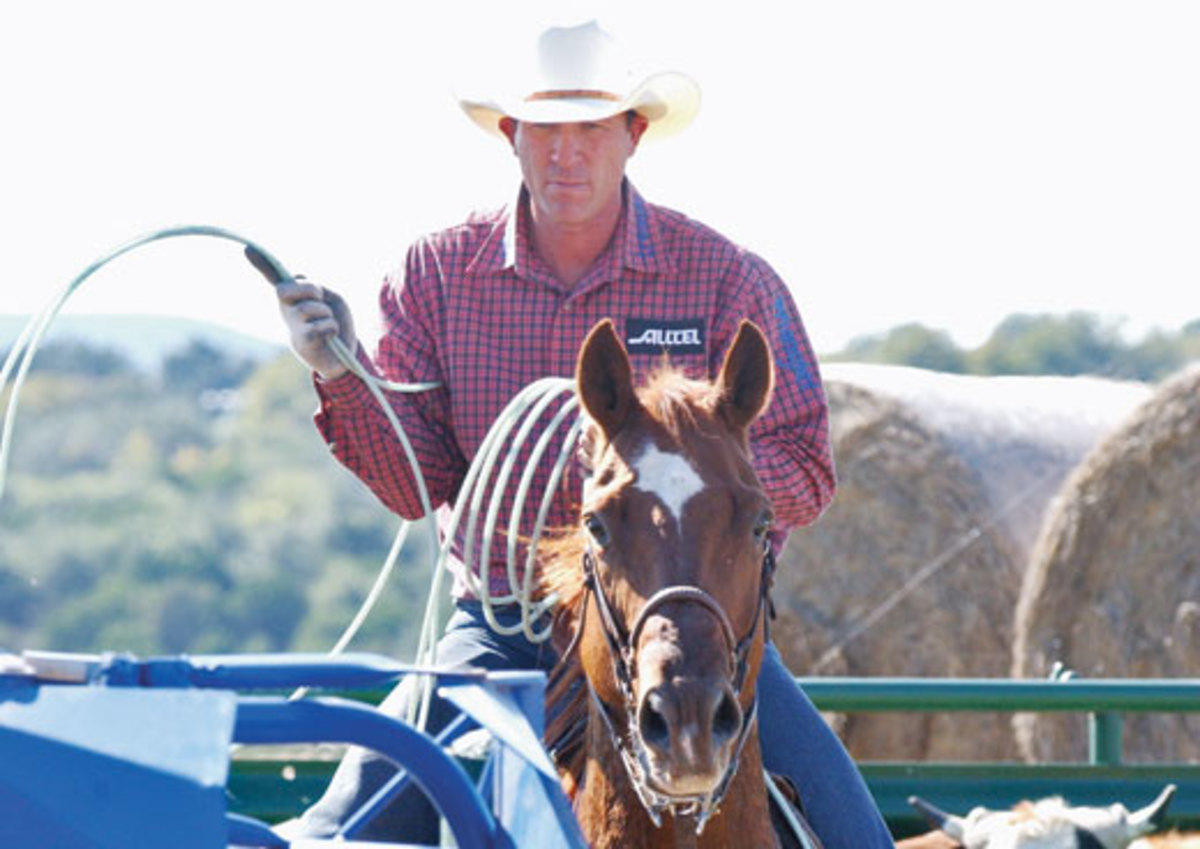There’s typically a difference in the way a woman, young kid, elderly or beginner roper scores vs. the way the top ropers score their horses. The basic difference is that lower-numbered ropers tend not to ask their horses to blow out of the box. They typically don’t have much tension on the reins, then take ahold of their horses to keep them from running out of there, and kick them to cue them to start. As a result, their horses don’t break as hard as a rule. It’s crucial for a top roper that a horse really scores good, and scores off of your hand. You need to be able to hold them snug, but when you release them have them start hard. It’s almost like a rubber band that gets stretched out. Then, when you let go, it’s gone. When you release your horse, you want him to take off that fast, too.

The lower-numbered ropers’ horses are usually calmer in the box, because their horses don’t have as much pressure put on them. The scorelines in their ropings tend to be shorter, and they don’t take ahold of their horses as much in the box. But if you want your horse to break harder out of the box so you can get more run out of him, you’ll have to start riding him more like the pros ride their horses. In order to advance, you’ll need to make your horse score on a tight rein and run out of the box harder.

Most lower-numbered ropers don’t have much bridle on their horses and their tiedowns aren’t snug, so their horses basically have to score on the honor system. The less pressure on a horse, the less bridle and tiedown you need. So those horses basically learn to operate at about 50-60 percent speed. If you want to start asking more of your horse, you have to be prepared for that. You need to hold your reins snug and keep that horse into the bridle slightly, so when the gates bang your horse will want to take off as soon as you release him to do that. Then, boom, you’re gone, and at full speed, where your first couple strides are full blast.

If you have no tension on the reins when your horse is backed in the corner, how’s he going to know when you want him to leave? And how’s he supposed to know that you want him to leave hard? If your horse has to wait for you to kick him, there’s a delayed reaction there.

There’s a transition to be made if you want to step it up. Low-numbered ropings are usually short scores, where it’s almost lap and tap; nod and ride. The more advanced you get, the more the scores are set out there further and the steers run harder. So as you climb the ladder of success, you have to learn to score better. Your horse has to score better and start harder. That can be a tough transition if you haven’t been preparing as you go. It’s kind of like some of the amateur ropers when they come into the PRCA, where the scores are longer and the conditions are tougher than what they’re used to. There are adjustments to be made.

A lot of scoring is being able to read how your horse is going to respond. If you fly in and have to borrow a horse, you have to develop a knack for reading a variety of horses. A lot of horses start turning their head to one side or another to avoid the whole deal. I like a horse to look straight ahead, so I look at the steer to the right side of my horse’s head and there’s no blind spot between me and that steer as I leave the box.

Scoring is an art. The more experience you have and the more horses you ride, the more you’ll expand and improve. If you can only ride one horse, you’re a one-dimensional roper. You have to learn to develop a feel for different kinds of horses, and learn to work with whatever horse you’re riding to your best advantage. The start you get is so critical. It sets up the run. At the top level, the type of start you get dictates your whole run. You need to know each horse you’re riding, and what buttons to push to help him help you get your best start. SWR










